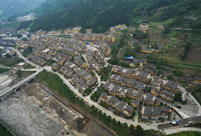 First overseas "China-standard" electric railway laid
First overseas "China-standard" electric railway laid
 College graduate launches organic agricultural cooperative in hometown
College graduate launches organic agricultural cooperative in hometown Guizhou Earthquake Emergency Rescue Team takes part in emergency exercises
Guizhou Earthquake Emergency Rescue Team takes part in emergency exercises Giant Spider-Man appears in Fuzhou
Giant Spider-Man appears in Fuzhou
 Beautiful Chinese-built roads in Africa
Beautiful Chinese-built roads in Africa Sagya Monastery in Tibet
Sagya Monastery in Tibet
 Young Chinese drive consumption
Young Chinese drive consumption
 The life of a model: Not as glamorous as it seems
The life of a model: Not as glamorous as it seems
 Hello Kitty, happy 40th birthday!
Hello Kitty, happy 40th birthday!
 The Western Qing Mausoleum
The Western Qing Mausoleum
WASHINGTON, May 16 (Xinhua) -- China's investment in African agriculture has nothing to do with "land grabbing," an agricultural expert said at a seminar on China's agricultural investment in Africa Friday.
"I think the land grabbing idea is a little hard to sustain because there has been quite a little China's agricultural investments in Africa," said Deborah Brautigam, a professor and director of the International Development Program of the Johns Hopkins University School of Advanced International Studies (SAIS).
Brautigam, who has followed China's agricultural relationship with Africa for 30 years, said some farmlands that Chinese companies have bought or rented are quite old, as some were even set up in colonial period.
"So that's hard to say that's land garb. That's just normal investment and hasn't displace anybody," said Brautigam
Brautigam also said if China companies want to be more successful in investing Africa's agriculture they need to bear more social responsibilities for the local community as the local governments may not keep their promises.
"Local governments don't always have the capacity to do it. They don't have the finance to do it. They don't have the incentives to do it. So if Chinese companies want to be seen as responsible investor they are probably going to take those responsibilities themselves," she said.
Brautigam suggested Chinese companies do more on training local people and transferring technologies, as well as offering long-term jobs for local people.
She said such actions will increase the cost of China enterprises to invest in Africa's agriculture. To reduce companies' burden, the Chinese government should partner more with these companies by providing subsidies.
"I think the subsidies can be on the side of the corporate's social responsibility, in terms of subsidies for training workers, or for doing environmental studies, or medication, compensation," Brautigam said.
 A bite of Jiang Nan
A bite of Jiang Nan PLA's tough exercises
PLA's tough exercises Best photos of the week
Best photos of the week  When we are young...
When we are young... Wedding photos of world champion
Wedding photos of world champion "The Most Beautiful Chinese Land"
"The Most Beautiful Chinese Land"  Men experience pains of childbirth on Mother's Day
Men experience pains of childbirth on Mother's Day  J-11 fighters training in complex meteorological conditions
J-11 fighters training in complex meteorological conditions Six years after Wenchuan earthquake
Six years after Wenchuan earthquake  8 great movies to watch with your mom
8 great movies to watch with your mom China's most luminous celebrities
China's most luminous celebrities Newly recruited police in Hetian hold drill
Newly recruited police in Hetian hold drill  Bird-men compete flying in Hong Kong
Bird-men compete flying in Hong Kong  The 'Chinese Dad'
The 'Chinese Dad' Shanghai locals bid farewell to childhood memories
Shanghai locals bid farewell to childhood memoriesDay|Week|Month